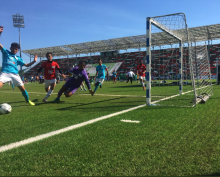World Cup

I can’t deny the unbridled excitement that this global phenomenon unleashes every four years. And since this year’s tournament is taking place in November (to avoid Qatar’s crushing summer heat), the international fervor coincides with the start of Advent. Somehow, it all feels fitting.

The United States did compete in a World Cup in Russia this year: the Street Child World Cup, a tournament and conference highlighting homeless youth's ideas for a better future.

Feminism and athleticism were one in the same to me. Four square matches, pick-up basketball games, and soccer scrimmages were all opportunities to prove that women were as valuable and gifted as men. Brandi Chastain with her shirt off and body flexed in uninhibited celebration was my Betty Friedan and my Bell Hooks.
But then puberty arrived, and brought with it hormones, testosterone, and different images of female athletes as the boys in my classes got their hands on the Sports Illustrated swimsuit edition (I’m a much bigger fan of the feminine strength displayed in ESPN’s “The Body Issue”). The Women's United Soccer Association — the world’s first paid professional women’s soccer league — closed down, and suddenly it seemed to me that the U.S. only cared about women’s sports when women traded in their sports bras for bikinis.
So when I read that this U.S. Women’s World Cup brought in 285 percent more viewers in its group stage play than ever before, and when I heard two twenty-year-old men at a jam-packed bar in D.C. rattle off statistics about Morgan Brian’s college scoring stats and Tobin Heath’s signature moves, I got excited.

Brazil and the World Cup are in the news now, but not in the way that pleases the Brazilian government. Crowds are gathering in the streets around football (soccer) stadiums where Confederation Cup games are being played but not to buy tickets or get autographs of their sports idols. They are congregating to protest against the 2014 World Cup coming to Brazil. Brazilians protesting football? Upset about hosting the World Cup? Something has gone seriously wrong. This is like the French boycotting wine or Italians accusing pasta of undermining family values.
Even Americans, confused as we are about why the rest of world insists on calling soccer “football,” know that the outcome of a football match can launch an entire nation into elation or despair. But no matter the sport, fans around the world follow the same emotional pattern: they are up when their team is up and down when they are down. World Cup championships played out on a global stage provide the winning nation with an outsized cathartic event for the pent up frustrations that accumulate with the stress and strains of daily life. And even without streets clogged with protestors, if you are a football fan living in one of Brazil’s major cities, the typical daily grind is almost unbearable. Here’s an account from an Al Jazeera reporter who lives in Brazil:
It is 8am and a bunch of people line up to get on a bus on Faria Lima Avenue in Sao Paulo. This may be their third transfer in the daily ordeal of travelling to work from the outskirts of Sao Paulo. When the bus slows down, people start to nudge right or left, hoping not to be left behind. Once they get on, it is so full that finding a little space to stand is only for the truly crafty.
After a one-hour journey through the infamous Sao Paulo traffic and pothole-ridden roads, crammed in with 100-plus people, it feels more like a ride on a rodeo horse than a means of transportation — all at a cost of 3.20 Brazilian Reals ($1.50) and your dignity.
It's that time of year again -- you know, when Clint Eastwood releases a trailer for a movie that looks fascinating and completely different from the last thing he did, and your trio of reactions run something like this: 1) Hmmm, Clint's got a movie coming out -- didn't we just see 'Gran Torino' five minutes ago?
I've been following the news story of New Zealand Olympic hopeful Logan Campbell. If you haven't heard, he's the taekwondo athlete who said he was forced to open a brothel to cover his training expenses for the 2012 London Olympics.